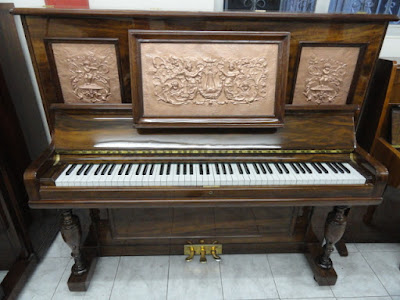PRINTERS' INK.
Woodbury, N. J., and its surrounding territory is not the brand new advertising country which some people may suppose it is. This little city of 4,000 inhabitants has its stories of wealth accumulated through the judicious use of printers' ink. Colonel Green, for instance, has accumulated a fortune as a result of advertising August Flower and German Syrup. Down by the depot may be seen the imposing Blasius piano works. From the [train] car windows one can read in flaming letters: "Woodbury Kennels," "Woodbury Stud Farm and Training Stables," and signs of other concerns which are known from the Atlantic to the Pacific and from the St. Lawrence to the Gulf. At Woodbury is the largest and best advertised carrier-pigeon loft in the world. Fancy chickens are other products of Woodbury well advertised. It is a camping place for half a dozen proprietary medicine people who advertise in a small way, and there are abundant rumors that Facial Soap Woodbury intends locating a manufactory there.
The traveler in South Jersey will frequently pass a trainload of mail or wagons loaded with fragrant (?) fertilizers. These fertilizers are manufactured by the West Jersey Marl & Transportation Company of Woodbury. This company is, I think, the best advertised concern in this peculiar line of industry in America, and it is the advertising story of its superintendent, John C. Voorhees, which follows this roundabout introduction.
"Perhaps the most trying period in South Jersey's history was when it was found that the section was purely a trucking country *," said Mr. "Voorhees. "This meant a comparative absence of animal fertilizers. In those days commercial fertilizers were almost unknown, but with the demand came the supply and soon there were more commercial fertilizer manufacturers and agents in South Jersey than in all the rest of the Eastern States. A 'Jersey Sweet' thrown at random would hit at least one fertilizer man. 'Time' was given in all kinds of old quantities—any one could have it for the asking. A man on the verge of bankruptcy would have been satisfied with his credit. There were fertilizer men who took it as a favor to take a year's note.
"In those days, even now, in fact, fertilizer men looked with scorn on printers' ink. The nearest approach to advertising by that medium was by printed rags tacked on trees, and tin, wooden or paper signs placed on fence rails. When the West Jersey Marl & Transportation Company commenced handling commercial fertilizers the members resolved to carry on its sales campaign through newspaper mediums. Out competitors were shocked. They said that plan of procedure would result in our ruin.
"The plan of campaign which we adopted at the time we have followed very closely since. First: We manufactured fertilizers fully equal to any other grades. Second: We hired the very best salesmen to he had, Third: We adopted a plan of approaching the farmer in advance of the salesmen. In one sense the fertilizer business is purely local. For instance,. our territory covers all of South jersey, We advertise in all of the papers in that country during the season, and in some of them all of the time. The space occupied is usually five inches, single column. I write all the advertising matter. I have tried various professional adwriters, but, while their work is good, they don't seem to get in touch with our custom.
"At the opening of the season we send to every farmer in our territory a booklet which contains statements of the virtues of our fertilizers from a chemical standpoint, and the various crops on which the various grades should be used. It also contains statements of the results obtained their use. Every week during the season we send each farmer a postal card, telling him the story of our fertilizers again, but in a new form. These postal cards are followed by our salesmen, and after they have covered the field we find that we have gained great many new customers and have retained the old ones.
"Every year we send out a calendar—not one of beauty, but one suggestive of the business and as useful as one of a more artistic character. It is made in the form of our bags. "As we do not use 'slug acid' in our mixtures they smell comparatively sweet, which we find sells goods. Consequently at the country fairs we present the ladies with a miniature fertilizer bag filled with sachet powder, bearing our ad with the sentence in bold letters, 'It Even Smells Good.'
"There is one thing I wish to particularly impress upon you, and that is that our advertising takes its value from the fact that our goods are what we represent them to be, no more and no less. We have never run away with the fallacy that a farmer does not know the difference between a $40 fertilizer and one that only costs $25. We have found that the farmer is a close analyst, and that 'all fertilizers do not smell alike to him.' We have never made the mistake either, of neglecting an old customer for the sake of making a new one."
Mr. Voorhees told me his story in a modest sort of way, but his particular company is now the leader of them all. It has doubled its business annually for the past decade. Week by week the farmers watch for Johnny Voorhees' ads.
FRANK A. HEYWOOD.
*truck farming: horticultural practice of growing one or more vegetable crops on a large scale for shipment to local or regional markets. As the use of railroads expanded and refrigerated carriers were introduced, truck farming spread.
Printers' Ink 1899 Woodbury NJ article















.JPG)






